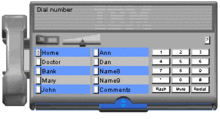RealThings
From Wikipedia, the free encyclopedia

IBM RealPhone—an example of the RealThings design methodology
IBM RealThings is a software interface design methodology proposed by IBM in 1998. Instead of using traditional computer-based elements, RealThings proposes that images of physical real-life objects are used instead. This was aimed to be more “natural and intuitive, allowing users to focus more on their tasks and less on computer artefacts.”[1]
As a demonstration IBM created RealPhone, RealCD and RealBook.
See also
References
"RealThings design guide". IBM. Retrieved 2006-11-11.
- ↑ Mullay (April 1998). "IBM RealThings". CHI 98 conference summary on Human factors in computing systems. ACM Press. pp. 13–14. doi:10.1145/286498.286505. ISBN 1-58113-028-7.
This article is issued from Wikipedia. The text is available under the Creative Commons Attribution/Share Alike; additional terms may apply for the media files.